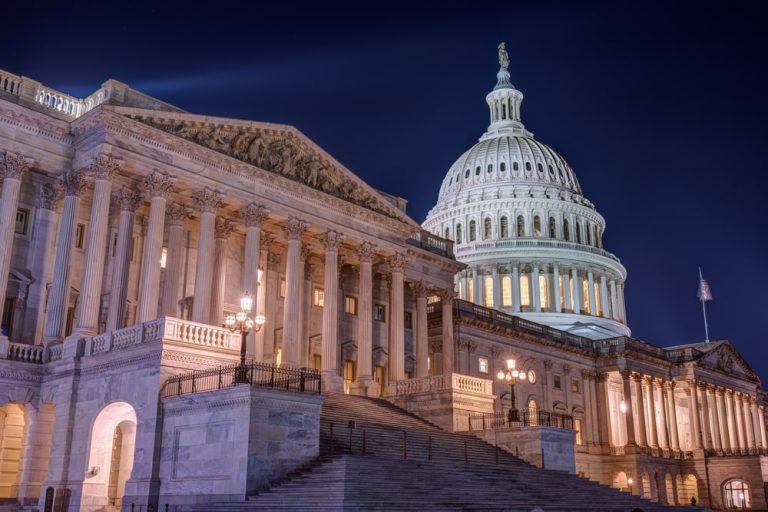In the June 2024 edition of The ICR D.C. Insider, we share our insights on President Biden’s tariff increases on Chinese imports, SEC leniency criteria, the FTC and the DOJ’s joint public inquiry to identify serial acquisitions and roll-up strategies, and more. Get this month’s analysis about developments in Washington that could impact your business.
What’s Next In Washington
- Trade & Tariffs – Politics & Policy – President Biden unveiled steep tariff increases on an array of Chinese imports, including electric vehicles, computer chips, and medical products – as former President Trump called for 10% tariffs on all imports, 100% tariffs on cars made outside the U.S., and a minimum 60% tariffs on Chinese goods. Among the specifics identified in Biden’s announcement were:
- The tariff rate on semiconductors will rise from 25% to 50% by 2025.
- Tariffs on Chinese-made EVs will quadruple to 100% from 25% on August 1, 2024.
- Rates on solar cells will double to 50% on August 1, 2024.
- Duties on some advanced batteries and the key components used to make them will rise to 25% on August 1, 2024.
- Tariffs on certain steel and aluminum products will triple to 25% on August 1, 2024.
According to the Biden administration, the new duties will apply to about $18 billion of annual Chinese imports. Notably, the president also pledged to keep tariffs on more than $300 billion worth of Chinese goods put in place by former President Trump – measures that Biden had previously criticized in his 2020 election campaign as hurting American consumers.
- More Spending On The Way – The Biden Administration continues to do all it can to deploy the $1.6 trillion in loans, grants, and tax credits meant to advance a green economy, revive the country’s manufacturing base, repair its roads and bridges, and challenge China for technological supremacy. Spending announcements have totaled more than $543 billion, about half of the administration’s overall planned investment, and not all of the money is available to spend in any one year. Many federal agencies have as long as five years to expend funding from the infrastructure law, for example. However, to date, the majority of these funds – which come from the American Rescue Plan, the bipartisan infrastructure law, the CHIPS and Science Act, and the Inflation Reduction Act – have not been spent. Specifically:
- Of the $1.1 trillion those four laws provided for direct investments on climate, energy and infrastructure less than 17% has been spent as of April 2024.
- Of the $884 billion provided by the infrastructure law and the American Rescue Plan, only $125 billion has been spent, and roughly $300 billion won’t be available to spend until the next two fiscal years.
- Of the $54 billion made available via the CHIPS and Science Act, less than $700 million has been awarded, though the Commerce Department has announced $29 billion in tentative awards to semiconductor manufacturers in recent months.
At the same time, former President Trump said he should have the power to refuse to spend congressionally appropriated money he considers wasteful, despite a 1974 law that says otherwise, and noted that he would probably halt all pending grant approvals and applications until his new Administration could scrutinize them.
SEC
- Bipartisan Group of Senators Want New Stock Buyback Rule – Sens. Tammy Baldwin (D-Wis.) and Marco Rubio (R-Fla.) called on the Securities and Exchange Commission (SEC) to repropose a stock buyback rule that was struck down by a federal court last year. In a letter to SEC Chair Gary Gensler, the senators wrote that “enhanced disclosure proposed by the final rule would have benefited all investors by improving price discovery.”
- Leniency Criteria Outlined – SEC Director of Enforcement, Gurbir Grewal put companies on notice that in order to earn leniency from the Commission, they need to go above and beyond what’s legally required. He emphasized that companies need to do more than just respond to subpoenas within a reasonable amount of time, telling an audience of white-collar lawyers, “When it comes to witnesses, as with documents, you likely have a better sense of who has relevant information and you have a better sense of where difficult-to-reach witnesses are located. And that can help us identify the people that we need to really speak with to get the information we need.” Grewal’s comments underscore the SEC’s increased focus on cooperation and proactive measures from companies under investigation, and the downside for those they see as recalcitrant.
PCAOB
- Naming Companies Tied to Auditing Deficiencies Explored – Public Company Accounting Oversight Board (PCAOB) Chair Erica Williams said the regulator is exploring whether it should reveal the names of companies that received deficient audits of their financial information as part of the PCAOB’s inspection reports. Over the years, investors have called for such disclosures, in part to learn which specific audits had problems.
FTC
- Serial Acquisitions & Roll-up Strategies Investigated – The Federal Trade Commission (FTC) and the Department of Justice (DOJ) launched a joint public inquiry to identify serial acquisitions and roll-up strategies that have led to consolidation and harmed competition. In a Request for Information, the agencies seek public input on corporate consolidation strategies that occur when a company becomes larger – and potentially dominant – by buying several smaller firms in the same or related business sectors or industries. Corporate actors, including private equity firms, engage in these types of acquisitions across a wide array of markets and industries. Often, businesses do not have to report these deals to the federal antitrust agencies, allowing firms to amass significant control over key products, services, or labor markets without government scrutiny. These types of transactions can harm competition to the detriment of consumers, workers, and innovation across an entire industry or business sector.
Cyber
- New Security By Design Initiative – The Cybersecurity and Infrastructure Security Agency (CISA) announced voluntary commitments by 68 of the world’s leading software manufacturers to CISA’s Secure by Design pledge to design products with greater built in security. With this pledge, companies commit to incorporate seven cybersecurity best practices into the development cycle of their products. These include building and managing disclosure programs for software vulnerabilities, making patches easier to install by customers, tracking intrusions by hackers, mitigating flaws across common areas in software design, reducing the use of default passwords, and enabling multifactor authentication across products as standard.
- International Cybersecurity Strategy Announced – The State Department debuted its plan to build global cybersecurity cooperation, following years of escalating threats from China, Russia, and cybercriminals. The plan is the first articulated S. global cyber strategy in more than a decade and, among other priorities, its goal is to elevate the U.S.’s role globally in countering cyber threats, create creating a global consensus on artificial intelligence, and position the U.S. against China in setting cybersecurity norms.
Additional Key Developments
- China
- In a show of bipartisan support, Congressional members from both parties and both sides of Capitol Hill recently traveled to Taiwan, marking the first congressional visits since the inauguration of new Taiwanese president Lai Ching-te and the large-scale Chinese military exercises that followed his swearing in. The Senate delegation was led by Sens. Tammy Duckworth (D-Ill.) and Dan Sullivan (R-Ala.), while Rep. Michael McCaul (R-Texas), Chairman of the House Foreign Affairs Committee led five additional members in meetings with President Lai.
- Senate Intelligence Committee Ranking Member Marco Rubio (R-Fla.) expressed concerns about a Commerce Department-backed deal between Microsoft and UAE-based G42 to build an advanced Arabic large language model. Despite G42’s historical ties to Chinese technology companies, under the terms of the deal, it has pledged to cut ties with those companies and follow safeguards in exchange for access to Microsoft’s technology. Rubio said, “I have serious concerns that the Biden Commerce Department, under Secretary Raimondo, is not adequately safeguarding our advanced technologies and pushing U.S. companies to cut deals that may end up endangering our national security.” China hawks in Congress are concerned that the deal will allow China to access sensitive AI technology, including advanced semiconductors. Commerce Secretary Gina Raimondo, who supports the deal as a way to bring the Middle Eastern tech company closer to the U.S., has said that the deal does not put sensitive technology at risk of transfer.
- The S. blocked imports from 26 textile companies, adding them to the Uyghur Forced Labor Prevention Act Entity List (now totaling 65 companies), which names businesses that the U.S. alleges are involved in exploiting forced labor from China’s Xinjiang region, home to the Uyghur people and other minority groups. The named businesses serve as middlemen, sourcing cotton from Xinjiang and selling it primarily to Chinese companies that use it to spin thread or make fabric.
- The House Foreign Affairs Committee voted 43-3 to give the President greater authority to impose export controls on artificial intelligence (AI) technology. The Enhancing National Frameworks for Overseas Restriction of Critical Exports [ENFORCE] Act was introduced by House Foreign Affairs Committee Chairman Michael McCaul (R-Texas) and House Select Committee on the Chinese Communist Party Chairman John Moolenaar (R-Mich.) and Ranking Member Raja Krishnamoorthi (D-Ill).
- The legislation would require a U.S. citizen to receive a license from the Commerce Department for “the export, reexport, or in-country transfer of” certain AI technologies deemed to pose a potential risk to national security and a license for “other activities that may support the design, development, production, use, operation, installation, maintenance, repair, overhaul, or refurbishing of, or for the performance of services relating to” an AI system that:
- Exhibits, or could foreseeably be modified to exhibit, capabilities in the form of high levels of performance at tasks that pose a serious risk to the national security and foreign policy of the United States or any combination of those matters, even if it is provided to end users with technical safeguards that attempt to prevent users from taking advantage of the relevant capabilities, such as by…substantially lowering the barrier of entry for experts or non-experts to design, synthesize, acquire, or use chemical, biological, radiological, or nuclear (CBRN) weapons or weapons of mass destruction.
- The legislation could apply to U.S. citizens working abroad, thereby potentially limiting the ability of U.S. citizens to work on AI projects in other countries.
- The legislation would require a U.S. citizen to receive a license from the Commerce Department for “the export, reexport, or in-country transfer of” certain AI technologies deemed to pose a potential risk to national security and a license for “other activities that may support the design, development, production, use, operation, installation, maintenance, repair, overhaul, or refurbishing of, or for the performance of services relating to” an AI system that:



